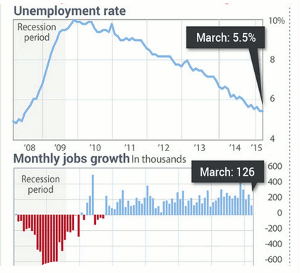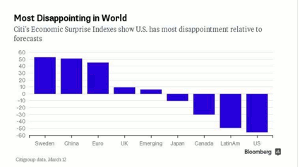Barry Norman, at FXEmpire.com, outlines how world currencies were impacted when the US Department of Labor published weaker-than-anticipated employment data for March on Friday and why this suggests the Fed may decide to take more time before hiking its base interest rate.
Most markets remain closed Monday for the long Easter holiday. Trading is expected to be light even when US markets open Monday, but reaction to the disappointing jobs data on Friday will continue to overshadow market sentiment. Japanese traders have, however, responded, sending the JPY to climb at 118.96 against the US dollar with the US dollar tumbling 93 points to trade at 96.84. The euro is trading at 1.0971 after surging to the 1.10 level after the release of the NFP.
After the US Department of Labor published weaker-than-anticipated employment data for March on Friday, equity futures tumbled during a 45-minute trading session on Wall Street before closing for Easter holidays. The jobs data suggest the US Fed might take more time before hiking its base interest rate, making the policy move in September rather than in June, as had been projected previously. Consequently, the dollar fell, posting a third week of slight weakening against its major peers, while US Treasuries advanced, with yields on a 10-year Treasury bill falling to their 2-month lowest, suggesting that expansion in the US economy would be more modest and less risky.
American employers’ added only 126,000 jobs in March compared to the anticipated figure of 245,000, the most modest monthly add in over a year. The actual figure, in fact, should not have been this surprising as the US governmental spending, the main driver of America’s economy at this point, actually decreased by 7.3% in Q4 2014 hence the slower overall economic expansion in Q1 2015. Coupled with dire economic effects of the severe winter, the currently soft data is not a trend, suggesting the pace of employment is most likely to pick up in the upcoming months.
The greenback retreated for a third week straight, due to investors being data-sensitive, having concluded the Fed would not hike rates in June and selling off the greenback. The Dollar Index lost 0.8%, with the dollar sliding to its lowest against ten major peers in one month. The euro rose 0.8% to $1.0976, while the yen rose 0.1% to 118.97 against the dollar. German and Japanese exporters will not be happy with the news, so select European and Asia-Pacific Indices may slide into the red early next week.
The dollar’s steep ascent against many of the world’s currencies since last summer could help delay the first Federal Reserve rate hike since 2006. In turn, that could affect mortgage and other long-term rates. The FOMC officially hasn’t paid much attention to the dollar’s swings, honoring a separation of powers that goes back to the central bank’s creation: The Fed is responsible for monetary policy, while decisions about the dollar are the US Treasury Department’s domain. But under Janet L. Yellen, the Fed has made clear that the dollar is on policymakers’ minds as they contemplate what to do with rates.
By Barry Norman at FXEmpire.com












